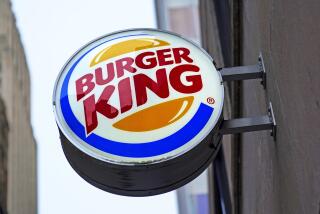Jury Finds Magazine Erred in Isuzu Critique
- Share via
A federal jury found Thursday that Consumer Reports, America’s widely respected product guide, falsely reported that the 1995-96 Isuzu Trooper sport utility vehicle displayed a unique and extremely dangerous propensity to roll over during emergency turns.
But jurors in the $244-million product disparagement and defamation suit declined to impose any monetary penalties against the magazine’s publisher, nonprofit Consumers Union.
Jury foreman Don Sylvia said eight of the panel’s 10 jurors wanted to award Isuzu as much as $25 million.
“We didn’t do it because we couldn’t find clear and convincing evidence that Consumers Union intentionally set out to trash the Trooper,” he said.
Sylvia, a manager at the Veterans Administration medical center in Westwood, said testimony during the two-month trial left many jurors feeling that Consumer Reports had behaved arrogantly during its testing of the Trooper and in its publication of the October 1996 article that branded the Trooper not acceptable.
“This verdict is a slap on their wrist,” he said.
Both sides in the case issued victory statements: Consumers Union because it was found not liable for damages, and Isuzu because the jury rejected much of the magazine’s criticism of the Trooper.
“While we regret that the jurors did not find every one of the published statements under consideration to be accurate, their verdict generally acknowledges the honesty of our testing and reporting staff and our belief in our procedures,” said Rhoda H. Karpatkin, Consumers Union president. “Moreover, the jury upheld our right to criticize a product that we believe represents a safety risk to consumers.”
Isuzu issued a statement saying, “The jury’s finding on falsity today provides clear vindication for the Trooper, which has an excellent safety record in the real world.”
Andrew M. White, Isuzu’s lead trial counsel, said he felt the evidence met the standard for malice, and therefore damages, but “apparently the jury did not. The press, as it should be, is protected by a very high standard when it comes to malice.”
Testimony in the trial before Los Angeles federal court Judge Richard A. Paez focused on a specially designed lane change maneuver used at Consumers Union’s 327-acre track in East Haddam, Conn., to test the resistance of SUVs to rollovers in emergency situations.
Three engineers drove the Trooper through a zigzag course intended to simulate what might happen if a driver suddenly had to avoid a child who darted into his path.
Rounding the turns at just over 33 mph, the Trooper “lifted both right wheels high off the pavement. It would have rolled over completely were it not for our test driver’s quick and skillful steering,” the Consumer Reports article said. All told, the Trooper’s two right wheels tipped up during 75 of 192 lane-change maneuvers, Consumers Union said.
According to Isuzu, however, the test drivers caused the Trooper to tip by turning the steering wheel faster and farther than drivers would ever do in the worst emergencies.
Isuzu noted that the National Highway Traffic Safety Administration and its British government counterpart had rejected Consumers Union test procedures as unscientific on grounds that they were subject to influence by drivers.
To underscore the point, Isuzu introduced evidence claiming to show that Consumers Union test drivers registered varying tip-up rates, ranging from occasional to frequent.
In response, Consumers Union insisted that the drivers’ steering “inputs” and their tip-up rates were essentially the same, an argument that the jury ultimately rejected.
Consumers Union also maintained that the National Highway Traffic Safety Administration’s criticism of its testing methods was unjustified, stressing that many auto manufacturers, including Isuzu, had used the same kind of test.
In their deliberations, the jury was asked to review 15 statements from the disputed article and from news conferences held by Consumers Union before and after publication of the article.
They found eight statements true and seven false. Among those found to be false were published statements saying that the Trooper had “a unique and extremely dangerous propensity to roll over in a real-world emergency avoidance maneuver”; another contending that the Trooper’s rollover propensity stemmed from a design flaw; and another asking why Isuzu had not tested the Trooper before putting it on the market.
But the jury found true the use of the word, “unsafe,” over a photograph of a Trooper tipping up on its two right wheels during a test run. Karpatkin cited this as vindication of the organization’s testing procedure. Sylvia, the jury foreman, said the panel indicated there was no doubt that the Trooper had tipped up during the tests, but the problem was the drivers’ over-steering.
In the next phase, the panel was asked whether any of those statements were disparaging. They listed all but two.
They then had to decide if there was clear and convincing evidence that Consumers Union had published those statements knowing that they were false or made with reckless disregard for the truth. They chose only one.
Finally, they had to decide whether any of the false and disparaging statements caused specific damages to Isuzu. On that score, they found none.
Consumer Reports, with a paid circulation of about 5 million, has been critiquing products for 64 years. Since 1968, it has been sued a dozen times and never lost a case or paid an out-of-court settlement.
While lawyers and officials at Consumers Union clearly were relieved at being found not liable for damages Thursday, another major legal battle is looming.
Suzuki Motor Corp., whose Samurai SUV was branded rollover-prone by Consumer Reports in 1988, has a companion suit pending in federal court in Santa Ana.
More to Read
Inside the business of entertainment
The Wide Shot brings you news, analysis and insights on everything from streaming wars to production — and what it all means for the future.
You may occasionally receive promotional content from the Los Angeles Times.










